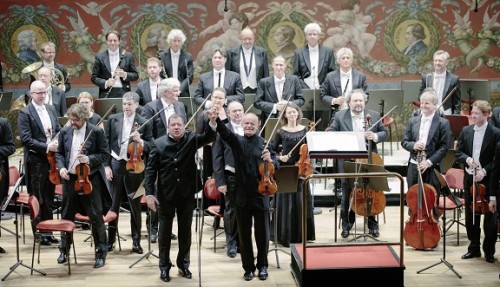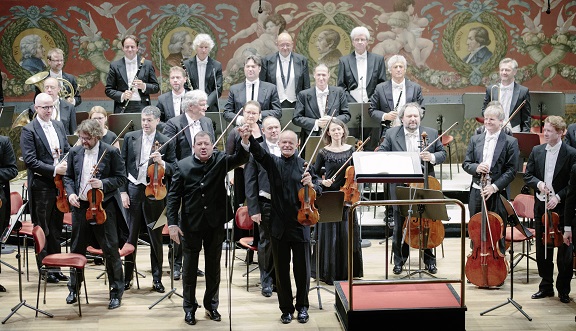
 Germany Dresdner Musikfestspiele 2018 [10] – Brahms: Thomas Zehetmair (violin), Dresdner Festspielorchester / Ivor Bolton (conductor), Semperoper, Dresden, 21.5.2018. (MC)
Germany Dresdner Musikfestspiele 2018 [10] – Brahms: Thomas Zehetmair (violin), Dresdner Festspielorchester / Ivor Bolton (conductor), Semperoper, Dresden, 21.5.2018. (MC)

Brahms – Variations on a Theme by Joseph Haydn, Op.56a; Violin Concerto, Op.77; Symphony No.2, Op.73
Performing on period instruments, the Dresdner Festspielorchester under the experienced direction of Ivor Bolton was founded in 2012 for performances at the Dresdner Musikfestspiele. Specialising in historically informed performance practice, the orchestra was formed in the spirit of the renowned former court orchestra of August the Strong who reigned in Saxony 1694-1733. I have attended five concerts by the orchestra at the festival and it programmes fascinating music from J.S. Bach to Richard Strauss, Vivaldi to Mascagni; exploring wider eras than one might imagine.
This all-Brahms concert commenced with Variations on a Theme by Joseph Haydn for orchestra a frequently encountered work in the concert hall. Impressive was how the players were able to emphasize the differences in the often-repetitive thematic material while successfully developing the increasingly majestic writing.
Next the Brahms Violin Concerto with Thomas Zehetmair playing a 1751 Guarneri violin fitted with gut strings, period bow (2nd half – 19th century) and clearly using vibrato very sparely. Zehetmair didn’t seem to treat his strings with circumspection playing with all his renowned accuracy and appropriate weight when needed, however, ideally I would have preferred a slightly richer violin tone. This was a performance that felt eminently fresh and I heard detail in the work that I hadn’t been aware of previously. Standing out in the mellifluous opening movement was how the players and soloist relished those gorgeous melodies and Zehetmair was mighty impressive in the cadenza although the timpani part was often far too loud, and generally throughout the performance it needed moderation. Revelling in the unalloyed lyricism of the beautiful Adagio Zehetmair with achingly expressive playing, was cautious not allowing the mood to become sentimental. In the squally and exciting writing of the spirited rondo finale with its noticeable gypsy flavour, wonderfully vibrant playing from both Zehetmair and orchestra capped a high-quality performance. Notable, was how Bolton was not afraid to demand bite from his players when required. For my taste an additional degree of emotional tension from both soloists and orchestra would have assisted the interpretation.
After the interval Bolton conducted Brahms’s Symphony No.2 a work that the composer wrote quickly, largely during a summer vacation in the resort of Pörtschach am Wörthersee, Austria. This was an impressively coherent if rather standard account in which Bolton unmistakably lavished considerable care and attention, confidently bringing out the joyful and frequent pastoral character of the writing. With moderate pacing Bolton who didn’t seem to be pushing his players too hard, obtained splendid results that were fresh and invigorating, strongly evocative of verdant and rustic Alpine scenes. Convincingly the playing had a heartfelt glow resulting in a performance that felt delightful and uplifting. It would be remiss not to highlight the glowing range of orchestral colours that the players produced. The high strings sounded sweet and the low strings rich and highly effective combining for a lovely unity. There was a distinct pastoral quality to the woodwind choir and the sound from the brass was entirely satisfying, a quality not always attributed to period brass instruments. Thankfully here the timpani was not too loud. At the memorable conclusion of the score Bolton generated a festive quality that evoked a notable event or celebration taking place.
I have no hesitation in spreading the word that Dresdner Festspielorchester concerts have become special events to treasure.
Michael Cookson
